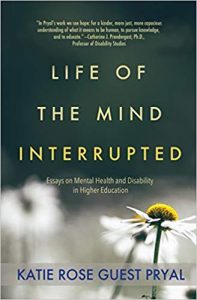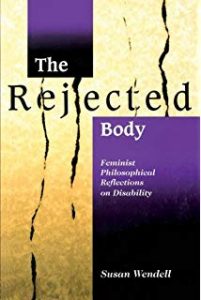Claiming My Education: Defining Mental Health–Disability or Debilitating?
by Makenna Clarke
“Student Feature” is a new addition to the WGS blog. Student-scholars enrolled in WGS courses have consented to share their experiences inside and outside the classroom with the Hope community. Today, the “Student Feature” features WGS 200 student-scholar Makenna Clarke.
On February 22, 2019, I attended Katie Rose Guest Pryal’s lecture, “Disclosure Blues: Transforming Mental Health in Higher Education.” I chose to attend this event because of my passion for mental health awareness as well as my own experiences with it. Pryal started out the event by documenting her personal experience with mental health which included bipolar disorder, anxiety, and PTSD. She talked about her time as a student but mainly focused on how mental health played a role in her position as a professional in higher education. Pryal discussed how she taught at a school where she was a non-tenured faculty member. Despite her many credentials, she still had no job security as long as she wasn’t tenured and was even more worried about reaching tenure as a person with a psychiatric disability. For the years that she worked in higher education, Pryal never disclosed her disability to any coworkers or superiors, which caused her an immense amount of stress. Ultimately, Pryal decided to leave higher education because the stress of hiding his disability was no longer worth it to her. She goes on to explain how the higher education system needs to fix contingency in order to better accommodate neurodivergent people. She goes on to defining terms one should know in order to have effective conversations about disability and what we must do to “get to a better world.” According to Pryal, this includes examining fears such as gut-level reactions to neurodiversity, examining structural problems, as well as ableism. After the event was over I decided to buy her book and asked her to sign my copy. She asked me why I came to the event and I told her my story which was really neat. We had a great conversation and I was so appreciative that she was willing to spend her time listening and talking with me.
Pryal called one of the sections of her presentation “Use the Right Words” which I found to be very informative. She explains how when discussing disability it is important to use identity-first language (i.e. disabled person). Pryal explains how “normate” is a better term than “able-bodied” because it implies that not all  disabilities are physical. To me, the most interesting term she talked about was “psychiatric disability” as opposed to “mental illness,” which implies a sickness that can be cured. Pryal prefers the term psychiatric disability because it can be an identity that one can claim, or even be proud of. She then discusses neurodiversity and neurodivergence which spans broader than psychiatric disability. Lastly, she defines accessibility and universal design, and even shares a quote from her book, Life of the Mind Interrupted, which says: “Usually, when we talk about helping people get what they need to make their way in the world – whatever their disability – the standard is ‘accommodation.’ That term connotes ‘doing something extra’ to meet someone’s needs” (102). As a student who receives academic accommodations, I really appreciated this quote because there are times that having accommodations makes one feel like an outsider.
disabilities are physical. To me, the most interesting term she talked about was “psychiatric disability” as opposed to “mental illness,” which implies a sickness that can be cured. Pryal prefers the term psychiatric disability because it can be an identity that one can claim, or even be proud of. She then discusses neurodiversity and neurodivergence which spans broader than psychiatric disability. Lastly, she defines accessibility and universal design, and even shares a quote from her book, Life of the Mind Interrupted, which says: “Usually, when we talk about helping people get what they need to make their way in the world – whatever their disability – the standard is ‘accommodation.’ That term connotes ‘doing something extra’ to meet someone’s needs” (102). As a student who receives academic accommodations, I really appreciated this quote because there are times that having accommodations makes one feel like an outsider.
I thought this event related very well to Susan Wendell’s “The Social Construction of Disability.” Wendell writes, “I see disability as socially constructed in ways  ranging from social conditions that straightforwardly create illnesses, injuries,
ranging from social conditions that straightforwardly create illnesses, injuries,
and pour physical functioning, to subtle cultural factors that determine standards of normality and exclude those who do not meet them from full participation in their societies” (58). At the beginning of the event, Pryal made a comment how when she was first given a diagnosis of bipolar disorder, anxiety, and PTSD, and she felt uncomfortable identifying herself as a disabled person because society typically doesn’t define disability in such a way. Over time she realized that she wasn’t going to let this language have power over her, and instead she would allow herself to identify how she truly felt.
Works Cited
- Pryal, Katie Rose Guest. Life of the Mind Interrupted: Essays on Mental Health and Disability in Higher Education. Blue Crow Publishing, LLC, 2017.
- Wendell, Susan. “The Social Construction of Disability.” The Rejected Body. New York, Routledge, 1996, pp. 57-68.


It was delightful to meet you, Makenna—chatting with you after the talk was a pleasure. Best of luck with your future work. I’m sure you will do amazing things. -Katie P.